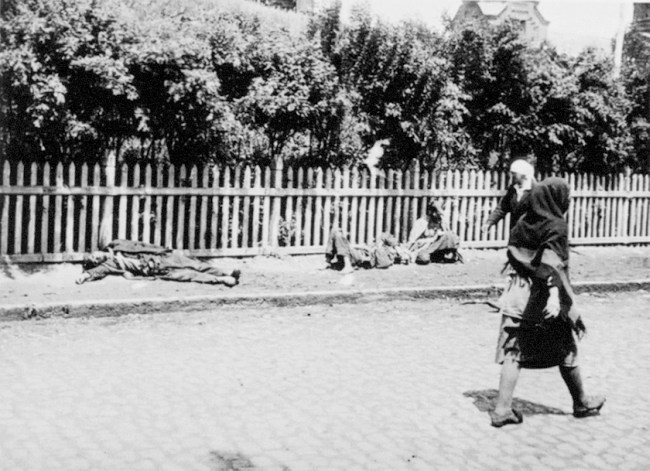Last year, my friend Bruce Kesler, who blogs at a wonderful conservative group blog called Maggie’s Farm, directed me to a book called Bloodlands: Europe Between Hitler and Stalin.
Although Hitler industrialized the killing machine, it was Stalin who created the model when he decided to destroy the Ukrainian kulaks (independent small farmers) who were standing in the way of his vision of a collectivized agrarian nation. To achieve his goal, he brutally starved these farmers to death — 20 to 30 million of them. Reading author Timothy Snyder’s description of their suffering is horrible — but it’s something that we need to read in order that we never forget how fundamentally evil socialism is. The ones who really should read this book, of course, are American socialists, but sadly, they’re unlikely to do so.
If you can get a socialist to read Bloodlands, but he has still failed to learn his lesson about what happens when government — which lacks a conscience — decides that its job isn’t to enable individual freedom but is, instead, to control all people without regard to individualism, have him read Yang Jisheng’s book, Tombstone: The Great Chinese Famine, 1958-1962
Arthur Waldron, writing at The New Criterion reviews Jisheng’s book and his review shows that this is a must-read book for anyone who wants to understand why Leftists are fools when they’re frightened of corporations and, instead, want desperately to place control over every aspect of their lives in government hands. It is impossible for a corporation to wreak the kind of havoc that socialist governments have visited upon their people. The estimates for Mao’s killing fields during his “man-created disaster” range from 36 to 70 million. (The higher number includes the babies that never got born to a starving population.) As happened with Stalin’s socialist-created famine, people in dire straits did unspeakable things to survive, including cannibalism. As Snyder said in his book (and I paraphrase), “an orphan was a child whose parents died before they ate him.”
When word of the Chinese famine got out, Mao blamed unspecified natural causes, and a credulous, Left-leaning, Walter Duranty-esque media dutifully passed this on. It was a lie, of course. There was nothing unusual about Chinese weather patterns from 1958-1962. Moreover, even as the people died in the millions, food filled warehouses and party officials dined in style.
Jisheng knows firsthand about the famine: alerted that something was wrong in his native rural area, he left the city with a rice ration, but arrived too late to save his father who, though alive, had become too starved to do anything but die. When this happened, Jisheng accepted the party line and didn’t question the thousands of deaths in his area of rural China. It was only during the mid-1960s Cultural Revolution, which saw many millions more die, that Jisheng began to realize that the problem wasn’t nature or farmers or people who needed re-education — it was Mao’s socialist policies, all of which officials throughout China unquestioningly accepted, either because they were true believers, because they were mindless party drones, or because they were afraid.
Although Jisheng’s book isn’t the first to tell about the famine, Waldron thinks it’s the best:
Tombstone, however, is without a doubt the definitive account—for now and probably for a long time. The Chinese original is two volumes and banned in that country. In Hong Kong it has sold out eight printings. The English version has been most skillfully shortened, edited, and rearranged by a team of Western and Chinese scholars, with an eye to making what is very much a massive compilation of statistics and reportage into a volume more accessible to the English-speaking reader.
This is a book whose importance must be compared with Aleksandr Solzhenitsyn’s Gulag Archipelago (1973) in that it documents beyond the possibility of refutation ghastly horrors that were first rumored, then denied, then written about a bit, but only with Solzhenitsyn and Yang were so thoroughly documented and analyzed as to place them beyond question.
You should read Waldron’s review and then, if you have the heart and stomach for it, read Jisheng’s book.
When socialism fails, as it invariably does, the American Left equally invariably claims that the failure isn’t because the plan was fundamentally flawed. To socialists, the problem is always implementation and the culprit is always the Republicans who made it impossible for the Democrats fully to implement their plans. Books such as Bloodlands and Tombstone remind us precisely what happens when the Left has unfettered access to a helpless population. Every person in America should be thanking God for Republican foot-dragging, and should hope that they drag their feet ever harder and faster.
